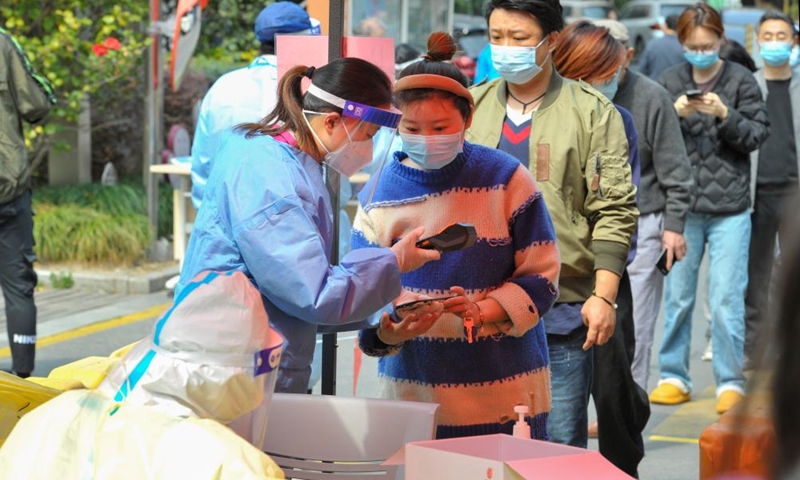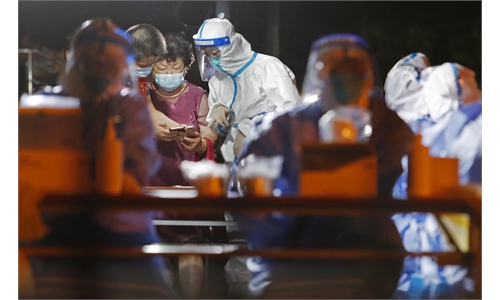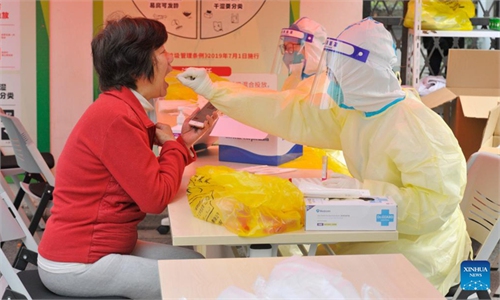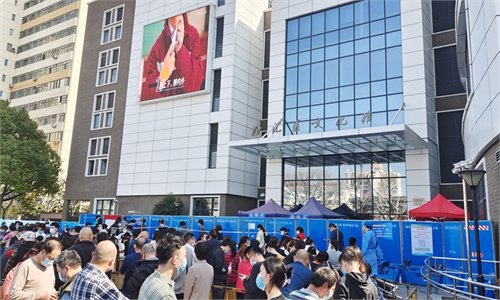Shanghai authority probes quarantine hotel as source of flare-up, says lockdown unnecessary

Residents register before receiving nucleic acid tests at a community in east China's Shanghai, March 13, 2022.Photo:Xinhua
Shanghai is not locked down and it is unnecessary for it to be locked down at present, the city's authorities said at a press briefing on Tuesday, as the city faces a challenging battle against COVID-19 in the latest flare-up caused by management malpractices at a quarantine hotel that has led to nearly 100 local confirmed infections and around 900 asymptomatic carriers across the city as of Tuesday afternoon.
The city reported four new local confirmed infections and 101 asymptomatic carriers on Tuesday afternoon, bringing the total number of confirmed local cases to 94 and silent carriers to 861 as of 2 pm Tuesday since March 1.
However, Shanghai has not adopted any measures to lock down the city or cause a standstill of the city, but has made efforts to minimize the impact on citizens' normal work and life in accordance with the requirements of coordinated epidemic prevention and control and the requirements of economic and social development, said Gu Honghui, director of the Shanghai epidemic prevention work group.
"Many epidemic prevention and control policies with high efficiency were first tried in Shanghai such as precise control and prevention. Despite the seemingly severe spread of this flare-up, we are still confident the policy of precise control and prevention with some specific strategies adjusted can curb the epidemic instead of adopting a lockdown of the city," Tao Lina, a Shanghai-based vaccine expert, told the Global Times on Tuesday, noting that he is optimistic about the situation.
Shanghai has launched a special investigation into the centralized quarantine site at Huating Hotel and Towers where the failure of its management led to the infections and the spread of the epidemic across the city, Gu said.
The incident has left a tremendous influence, and the lesson from the incident is profound, Gu said, noting that closed-loop management of staff at high-risk posts such as quarantine sites have to be strictly implemented.
According to Gu, those who neglect their duties will be held accountable for malpractices in accordance with the laws and the authority will release information on the progress of the investigation in a timely manner.
In a bid to further strengthen epidemic prevention and control in society, key areas will be designated in the city and nucleic acid screening will be carried out in a segmented manner.
Outside of key areas, companies are urged to adopt staggered work hours or home office to reduce people's movement.
Compared with previous outbreaks in the city, this flare-up caused by the Omicron variant has a stronger transmission capacity and faster spread, which has led to a higher proportion of asymptomatic carriers, spreading more secretly and more difficult to be detected in the early stage, Wu Fan, a member of Shanghai's COVID-19 prevention and control expert team, said.
Wu said this flare-up has widely spread in a variety of public venues such as schools, supermarkets, and public bathhouses with many people involved. The number of confirmed local cases and asymptomatic carriers has surpassed previous outbreaks. Nearly 90 percent of the infections are asymptomatic carriers.
A series of measures have been taken in the city to curb the spread of the epidemic with multiple transmission chains and community infections which make the prevention and control situation grim and complex.
All densely populated universities across the city have been placed under quarantine with students and faculty required to take nucleic acid tests.



